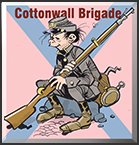FatR
Posts: 2522
Joined: 10/23/2009
From: St.Petersburg, Russia
Status: offline

|
quote:
ORIGINAL: xj900uk
Alternatively perhaps his super-agressive tactics just weren't working...
No tactics can work in the face of sufficient material superiority. Allied air superiority and constant naval presence around Guadalcanal meant that Japanese forces were doomed to be inadequate from the start, unless IJN beats the Allied fleet decisively. Except, after Midway odds already were against IJN and only successes of Japanese subs gave them even a chance of such victory. Except then IJN wasted it by not committing enough surface units when they had an edge (one of quite many cases when the fear of losses resulted in losses that would have been preventable otherwise). And tried to push the responsibility for resolving the situation on IJA, resulting in repeated failed offensives.
Similarly, almost all of the land battles in the Pacific were fought in the conditions that pretty much excluded the possibility of Japanese victory from the beginning, however well Japanese fought (and the first major Allied offensive operation at Buna-Gona demostrated that Japanese defensive tactics are not to be underestimated). Because Allied air and sea superiority allowed them to create such conditions, and all that. Similarly, because retreat was impossible or meant starving and dying out from diseases in the jungle, Japanese were doomed to take disproportional losses once their defensive lines collapsed and support elements, wounded, etc, were wiped out en masse.
By comparison, in the Burma theatre, where conditions were much less stacked against them, Japanese forces were overwhelmed only in 1945, that's after losing much of their strength in the desperate attempt to create a miracle by going on the offensive against Imphal.
< Message edited by FatR -- 4/12/2010 5:09:41 PM >
|
 Printable Version
Printable Version















 New Messages
New Messages No New Messages
No New Messages Hot Topic w/ New Messages
Hot Topic w/ New Messages Hot Topic w/o New Messages
Hot Topic w/o New Messages Locked w/ New Messages
Locked w/ New Messages Locked w/o New Messages
Locked w/o New Messages Post New Thread
Post New Thread